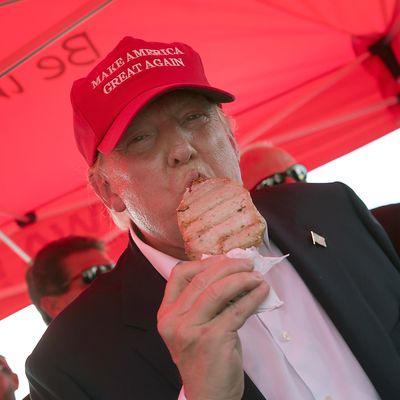
The Trump presidency has featured a stream of shockingly brutal coverage of the president’s inability to do his job, at least as every other modern president has defined the role. A recent New York Times account of Trump’s workaday routine is probably one of the gentler treatments of the subject. It lacks many of the most brutal details from past such stories, such as Trump’s refusal to digest briefing materials, inability to concentrate on substance or understand it when explained to him, and habit of interrupting and diverting White House staffers who actually are trying to work. (CNN reported this weekend that Trump’s irregular appearance at coronavirus task force meetings “often throws the meeting well off its assigned agenda and frequently centers on how his performance is being viewed in the media or in polling.”) Instead, it rather straightforwardly describes his routine of watching television and talking on the phone, sandwiched around a 90-minute to two-hour televised session of self-praise.
For whatever reason, though, this particular Times story infuriated the president. Trump lashed out at the Times in a series of tweets:
Perhaps dissatisfied with this rebuttal, Trump dispatched his aides to feed a counter-narrative to the conservative New York Post. The Post’s authorized account of Trump’s work habits begins, “President Trump’s schedule is so packed amid the coronavirus crisis that he sometimes skips lunch, his aides told the Post — refuting a report that the commander-in-chief spends his days obsessing over TV coverage and eating fries.” But the story does not so much refute the Times account as reframe the facts in a more flattering way.
The Post story quotes from Trump’s loyal aides commending his work ethic, without directly challenging the facts in the Times account. Several of them praise his tireless habit of calling them at all hours of the day, including one recent 3:19 a.m. phone call. Of course, nobody has accused Trump of enjoying unusually high or even adequate levels of sleep.
Likewise, Trump’s eating habits, a point upon which the Times barely touches, is the subject of obsessive attention by the Post. “I can tell you that the biggest concern I have as a new chief of staff is making sure he gets some time to get a quick bite to eat,” says Chief of Staff Mark Meadows. “There are times when lunch isn’t even a thought,” says another official, who is anonymous, perhaps out of embarrassment at having their name attached to such a sycophantic quote. “A lot of time, there’s either no time for lunch or there is ten minutes for lunch.”
It’s not clear why ensuring adequate presidential access to food would be Meadows’s highest priority at this time. If Trump is indeed working himself so hard he is skipping meals, the effect of this undernourishment is not yet visible.
Most of the rest of the story is given over to treating phone calls and television-binging as serious work. Trump is known to jabber constantly with Republican allies ranging from rich people to the hosts of his favorite Fox news programs. Meadows describes this for the Post as diligent presidenting: “Normally, he will get six or seven calls from members [of Congress] or business leaders or community leaders, so oftentimes what he will do is go up to the residence and have the White House operator literally do back-to-back calls.”
More comically, his aides spin his obsessive television-watching as strategic media monitoring — “like a linebacker watching tape,” one anonymous underling explains. “How else are we going to know what’s being said and what’s being reported out there?”
It’s more like a linebacker refusing to watch tape or even to listen to the dumbed-down summaries of the tape that his coaches try to read to him, and instead spending hours listening to sports-talk radio and frequently calling in to berate the hosts and insist he is actually the greatest linebacker of all time.
If it was actually necessary for the White House to have a fine-grained understanding of what cable news is saying about Trump minute by minute — and to be clear, it is not necessary — they could have an aide watch the shows and provide the president with regular summaries. You don’t have to assign that job to the president of the United States. The White House position is that there is literally no other way — “How else are we going to know” — for the administration to know what the media is saying than to have the president personally devote most of his waking hours to binge-watching cable.






























